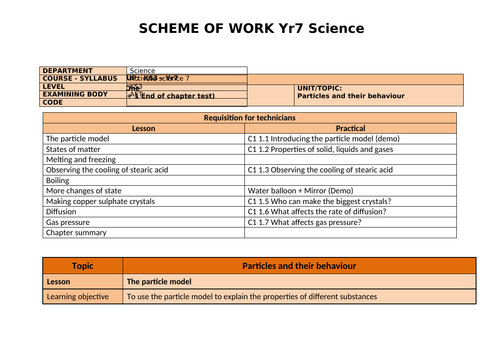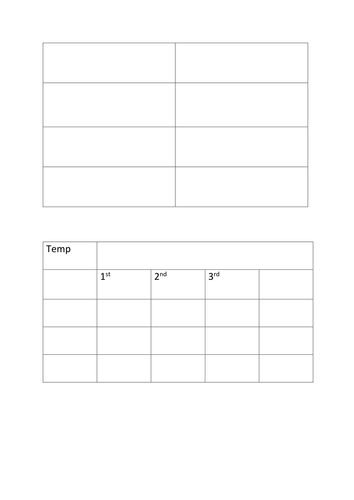243Uploads
112k+Views
55k+Downloads
Chemistry

Yr7 Particles. Scheme of Work for Kerboodle Activate 1 (SoW)
Content
Lesson objective
Skills objective
Learning outcomes
Keywords
Numeracy
Practical
Homework
Misconceptions
Key questions to ask
Lesson plans:
The particle model (Practical)
States of matter (Practical)
Melting and freezing
Observing the cooling of stearic acid (Practical)
Boiling
More changes of state (Practical)
Making copper sulphate crystals (Practical)
Diffusion (Practical)
Gas pressure (Practical)
Chapter summary

C4.2 Equations and calculations
AQA GCSE Sciences (9-1)
Chemistry: C4 Chemical calculation
Lesson 2: C4.2 Equations and calculations
Based on the Kerboodle Resources
The AQA Kerboodle worksheet are not included so as to be acting within the TES code of conduct.

C8.4 The effect of concentration and pressure
AQA GCSE Sciences (9-1)
Chemistry: C8 Rates and equilibrium
Lesson 4: C8.4 The effect of concentration and pressure
Based on the Kerboodle Resources
The AQA Kerboodle worksheet are not included so as to be acting within the TES code of conduct.

Atomic Theory
In this lesson, learners will learn about the billiard ball model, plum pudding model, nuclear model and Bohr model of the atom.
They will also learn the contribution of James Chadwick and how to distinguish the different sub-atomic particles.

Rutherford & The Nuclear Model
In this lesson, learners discover how Rutherford and his students deduced the nuclear model from the alpha scattering experiement.

C6.4 Electrolysis of aqueous solutions
AQA GCSE Sciences (9-1)
Chemistry: C6 Electrolysis
Lesson 4: C6.4 Electrolysis of aqueous solutions
Based on the Kerboodle Resources
The AQA Kerboodle worksheet are not included so as to be acting within the TES code of conduct.

C5.7 Neutralisation
AQA GCSE Sciences (9-1)
Chemistry: C5 Chemical changes
Lesson 7: C5.7 Neutralisation
Based on the Kerboodle Resources
The AQA Kerboodle worksheet are not included so as to be acting within the TES code of conduct.

Recording Data (Introduction lesson 4/4) "Graphs and Tables"
Designed to be the fourth lessons for Year 7s (4/4).
Learning outcomes:
(*) Describe the three different types of data.
(*) Calculate means.
(*) Draw a suitable graph for given measurements.
Students recap the three types of variables and then learn the three types of data (Continuous, Discrete and Categoric).
They are then shown how to fill in a results table (where the dependent and independent variables go).
They learn how to calculate means and how to plot this data onto a graph.
The steps in drawing a graph are laid out in a step by step method (designed to be down together with the whole class).
They are also informed on when to use line or bar charts.








